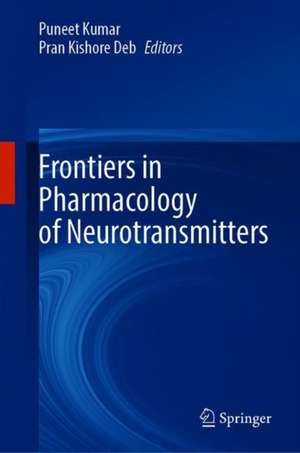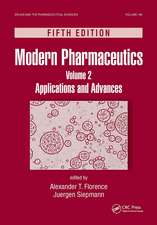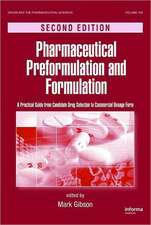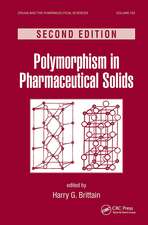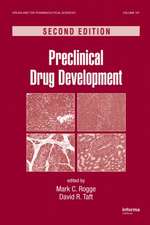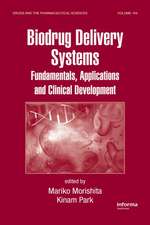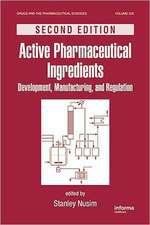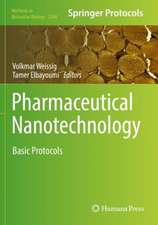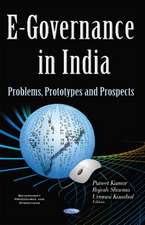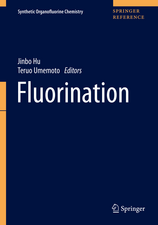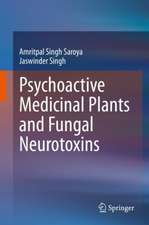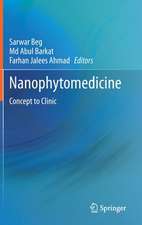Frontiers in Pharmacology of Neurotransmitters
Editat de Puneet Kumar, Pran Kishore Deben Limba Engleză Hardback – 30 oct 2020
This book provides a comprehensive and detailed explanation of brain neurotransmitters and their receptors and associated channels. It includes a basic introduction, and also discusses the functions and recent advances and their pharmacology, highlighting the role of various computer aided drug design (CADD) strategies for the development of therapeutic ligands to modulate these receptors/ion channels. Written in an easy-to-read style, it is intended for neuroscience and pharmaceutical students and researchers working in the area of brain neurotransmitters.
| Toate formatele și edițiile | Preț | Express |
|---|---|---|
| Paperback (1) | 1564.67 lei 6-8 săpt. | |
| Springer Nature Singapore – 30 oct 2021 | 1564.67 lei 6-8 săpt. | |
| Hardback (1) | 1571.01 lei 6-8 săpt. | |
| Springer Nature Singapore – 30 oct 2020 | 1571.01 lei 6-8 săpt. |
Preț: 1571.01 lei
Preț vechi: 1915.86 lei
-18% Nou
Puncte Express: 2357
Preț estimativ în valută:
300.65€ • 326.46$ • 252.54£
300.65€ • 326.46$ • 252.54£
Carte tipărită la comandă
Livrare economică 22 aprilie-06 mai
Preluare comenzi: 021 569.72.76
Specificații
ISBN-13: 9789811535550
ISBN-10: 9811535558
Ilustrații: XX, 721 p. 196 illus., 101 illus. in color.
Dimensiuni: 155 x 235 mm
Greutate: 1.21 kg
Ediția:1st ed. 2020
Editura: Springer Nature Singapore
Colecția Springer
Locul publicării:Singapore, Singapore
ISBN-10: 9811535558
Ilustrații: XX, 721 p. 196 illus., 101 illus. in color.
Dimensiuni: 155 x 235 mm
Greutate: 1.21 kg
Ediția:1st ed. 2020
Editura: Springer Nature Singapore
Colecția Springer
Locul publicării:Singapore, Singapore
Cuprins
Chapter 1. Introduction to neurotransmitters: state of the art.- Chapter 2. Drug-receptor interactions.- Chapter 3. Pharmacology and function of glutamate and its receptors.- Chapter 4. Pharmacology of gaba and its receptors.- Chapter 5. Pharmacology of acetylcholine and cholinergic receptors.- Chapter 6. Pharmacology of adrenaline, noradrenaline and their receptors.- Chapter 7. Pharmacology of dopamine and its receptors.- Chapter 8. Pharmacology of serotonin and its receptors.- Chapter 9. Pharmacology of endocannabinoids and its receptors.- Chapter 10. Pharmacology of adenosine receptors.- Chapter 11. Neuropeptides and neurotransmission.- Chapter 12. Pharmacology of gasotransmitters (nitric oxide and carbon monoxide) and their action.- Chapter 13. Pharmacology of histamine, its receptors and antagonists in the modulation of physiological functions.- Chapter 14. Pharmacology of angiotensin and its receptors.- Chapter 15. Pharmacology of melatonin and its receptors.- Chapter 16. Pharmacology of neuropeptides: substance p, vasoactive intestinal peptides (vip), neuropeptide y, calcitonin peptides and their receptors.- Chapter 17. Pharmacology of calcium channel.- Chapter 18. Pharmacology of potassium channels.- Chapter 19. Sodium channels: as an eye of the storm in various clinical pathologies.- Chapter 20. Hormones and steroids as neurotransmitters.- Chapter 21. Pharmacology of endogenous opioids, opiates and their receptors.
Notă biografică
Dr. Puneet Kumar is an Associate Professor at the Department of Pharmaceutical Sciences and Technology, Maharaja Ranjit Singh Punjab Technical University, India. He completed his PhD at the University Institute of Pharmaceutical Sciences, Panjab University, Chandigarh. His research interests include the pharmacological screening of herbal and semisynthetic and synthetic drugs in animal models of various diseases, such as movement disorders. He has published more than 115 peer-reviewed research and review papers/ book chapters and five books. He has more than 14 years of teaching and research experience, and has completed three major research projects for government-funded agencies. He received the International Brain Research Organization (IBRO) fellowship for attending IBRO neuroscience schools and has presented his research at various national and international conferences. Dr. Bansal is member of several highly respected national and international professionalsocieties, such as MNAMSc., NAMSc, APTI, IPS, IAN, IPGA, SNCI, LASA, IBRO, and MDS.
Dr. Pran Kishore Deb is currently working as an Associate Professor at the Faculty of Pharmacy, Philadelphia University, Jordan. He received his PhD in Pharmaceutical Sciences from the University Institute of Pharmaceutical Sciences (UIPS), Panjab University, Chandigarh, India. He is an active academic and researcher with 9 years of experience in the field. His key research interests include E-learning innovations, computer-aided drug design (CADD) and the development of new chemical entities (NCEs) targeting adenosine receptors, cyclooxygenase enzymes and TB. He holds one patent on TB and has published more than 75 scientific research and review articles in various peer-reviewed international journals as well as book chapters. He is a recipient of various prestigious national and international awards, including CSIR-SRF (PhD, India), Young Scientist Award, E-Learning GURU Award and Best Faculty Achievement Award. He has also received several national and international research grants from various funding agencies, including the Government of India, Malaysia and Jordan.
Dr. Pran Kishore Deb is currently working as an Associate Professor at the Faculty of Pharmacy, Philadelphia University, Jordan. He received his PhD in Pharmaceutical Sciences from the University Institute of Pharmaceutical Sciences (UIPS), Panjab University, Chandigarh, India. He is an active academic and researcher with 9 years of experience in the field. His key research interests include E-learning innovations, computer-aided drug design (CADD) and the development of new chemical entities (NCEs) targeting adenosine receptors, cyclooxygenase enzymes and TB. He holds one patent on TB and has published more than 75 scientific research and review articles in various peer-reviewed international journals as well as book chapters. He is a recipient of various prestigious national and international awards, including CSIR-SRF (PhD, India), Young Scientist Award, E-Learning GURU Award and Best Faculty Achievement Award. He has also received several national and international research grants from various funding agencies, including the Government of India, Malaysia and Jordan.
Textul de pe ultima copertă
Numerous phenomenal advances have been made towards understanding the role of neurotransmitters in the pathophysiology of neurological disorders, and these have resulted in a large number of novel molecules with the potential to revolutionize the treatment and prevention of such disorders.
This is the first book to provide a comprehensive and detailed explanation of brain neurotransmitters and their receptors and associated channels. It includes a basic introduction, and also discusses the functions and recent advances and their pharmacology, highlighting the role of various computer aided drug design (CADD) strategies for the development of therapeutic ligands to modulate these receptors/ion channels. Written in an easy-to-read style, it is intended for neuroscience and pharmaceutical students and researchers working in the area of brain neurotransmitters.
This is the first book to provide a comprehensive and detailed explanation of brain neurotransmitters and their receptors and associated channels. It includes a basic introduction, and also discusses the functions and recent advances and their pharmacology, highlighting the role of various computer aided drug design (CADD) strategies for the development of therapeutic ligands to modulate these receptors/ion channels. Written in an easy-to-read style, it is intended for neuroscience and pharmaceutical students and researchers working in the area of brain neurotransmitters.
Caracteristici
Provides valuable insights about the various Neurotransmitters and their receptors Elaborates in detail the role of various computer aided drug design (CADD) strategies for the design of therapeutic ligands modulating various receptors Identifies the latest pharmacological advancements towards better understanding of pathophysiology of Neurological receptors
